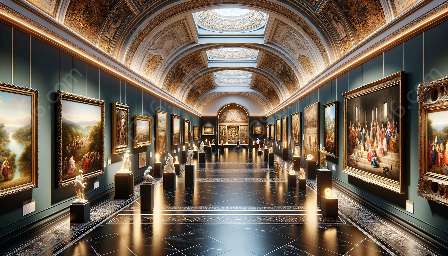The concept of intellectual property rights in the art world intersects with various ethical considerations, posing complex challenges and dilemmas. In the realm of art history, these intersecting issues give rise to a host of ethical concerns pertaining to ownership, cultural heritage, and creative expression.
Intellectual Property Rights in the Art World
Intellectual property rights encompass legal protections such as copyright, trademark, and patents that safeguard the intellectual creations of individuals and organizations. In the art world, these rights are crucial in protecting the rights of artists and creators, allowing them to control the use and reproduction of their works, and providing economic incentives for artistic innovation.
Ethical Considerations
When discussing intellectual property in the context of art, ethical considerations become paramount. One of the primary ethical issues is the balance between the creator's rights and the public interest. The tension between protecting an artist's work and ensuring access to cultural heritage and knowledge has been a point of contention in the art world.
Plagiarism and Appropriation
One ethical dilemma arises from the appropriation and use of existing artworks, where the line between inspiration and plagiarism can blur. Artists, especially in contemporary art, often incorporate elements of copyrighted works or cultural artifacts, sparking debates about originality and respect for intellectual property.
Cultural Heritage and Ownership
The ethical dimensions of intellectual property rights also extend to issues of cultural heritage and ownership. Artifacts and traditional designs that hold cultural significance for communities may be copyrighted or patented, raising questions about the commodification and exploitation of cultural knowledge and artistic traditions.
Ethical Issues in Art History
Exploring the historical context of art provides insights into the ethical challenges that have persisted over time. Art history is replete with instances where intellectual property rights intersected with ethical considerations, shaping the evolution of artistic norms and legal frameworks.
Artistic Integrity
Throughout art history, debates surrounding the ethical treatment of artists' works have been ongoing. Instances of misattribution, unauthorized alterations, and unauthorized reproductions have challenged the ethical underpinnings of intellectual property rights, bringing attention to the need for ethical guidelines in the art world.
Protecting Cultural Integrity
The ethical dimensions of intellectual property intersect with the preservation of cultural integrity within art history. As art reflects the values, beliefs, and traditions of societies, the ethical use and representation of cultural elements demand careful consideration to avoid appropriation or misrepresentation.
Conclusion
The interaction between intellectual property rights and ethical considerations in the art world is a multifaceted and dynamic area that demands ongoing reflection and dialogue. By understanding the nuances of this intersection, the art world can navigate the complexities of protecting artistic expression while upholding ethical standards for the benefit of creators, audiences, and global cultural heritage.

